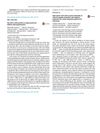Alternative Splicing Factor Esrp1 Controls Homeostasis of Skin by Regulating Barrier Formation and Function
TLDR Esrp1 is important for skin health by helping form and maintain the skin barrier.
The document discusses the role of the alternative splicing factor Esrp1 in maintaining skin homeostasis, particularly its importance in the formation and function of the Tight Junction (TJ) in the epidermis. The TJ is crucial for protecting against infection and preventing water loss. The study found that the ablation of Esrp1/2 in epithelial cells leads to widespread changes in the alternative splicing of genes involved in epithelial cell development, function, and TJ formation. This disruption of TJ integrity results in epidermal barrier dysfunction, chronic skin inflammation, and global hair loss with the disappearance of hair follicles when Esrp1/2 is ablated postnatally. The findings highlight the significance of Esrp1 in skin barrier function and its association with skin diseases such as atopic dermatitis and psoriasis.
